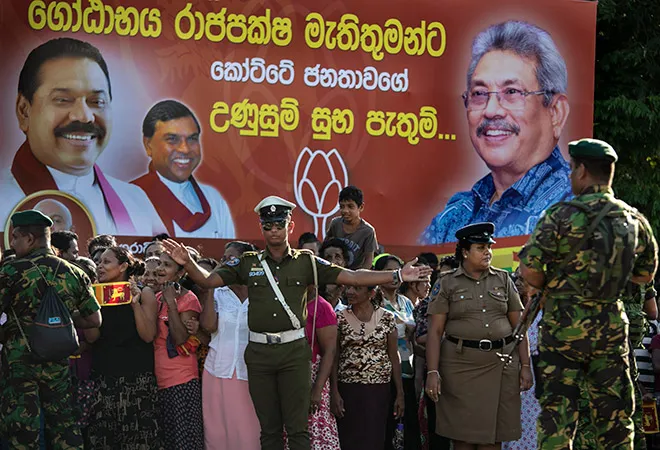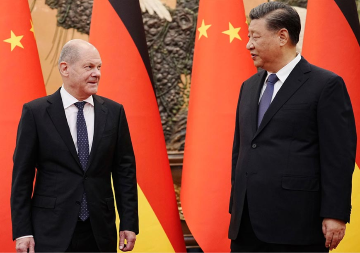
For the Rajapaksa brothers, who have won a resounding second electoral win in nine months, their personal politico-administrative behaviour of recent years should hold a mirror to the future. Despite winning the decades-old ethnic war against the LTTE, leading to the latter’s decimation with it, and voting in incumbent President Mahinda Rajapaksa for a second term in 2010, the Sri Lankan voters had no qualms, sending him packing five years hence, when ‘democracy issues’ returned to the centre table, though not in as big a way as their critics, more outside the country than inside, would have wanted. That should also explain their bouncing back almost effortlessly in last year’s presidential polls, not that they had experienced any attrition to their 40 per cent minimum voter base, comprising mostly Sinhala-Buddhist core elements in the country, in which the community accounts for 75 per cent of the population.
The Rajapaksas’ ruling SLPP combine won a total of 151 seats (including allies that contested on their symbols) in the 225 seat Parliament, in the 5 August polls, which were postponed twice owing to the intervening Covid-19 pandemic. In between, the nation’s Supreme Court vetoed their critics’ demand for reconvening of the previous Parliament, which President Gotabaya Rajapaksa had dissolved on 2 April, under a restricted constitutional mandate, put in place by the previous regime. The 1978 Constitution had empowered the president to dissolve Parliament without assigning any reason any time after one year of its existence. The 19th Amendment in 2015 limited the period to (the last) six months of the House, not that it made any sense either.
The 1978 Constitution had empowered the president to dissolve Parliament without assigning any reason any time after one year of its existence.
Now, the Rajapaksas want to revise 19-A or the Constitution, wholesale, as both carry inherent infirmities that have impacted on the government’s functioning, and also the character of the Sri Lankan state. The nation is sure to take up a serious discourse on that sooner than later, as that is also on the top of the Rajapaksas’ political agenda and election manifesto, both for the presidential polls of November 2019 and now the parliamentary elections.
Given that the top two positions are occupied by biological brothers, who have also displayed a lot of respect for each other’s strengths, the kind of hiccups that marred the previous regime are not expected now. Yet, in fashioning the constitutional changes, they will also end up making it as personalised as then president J.R. Jayewardene did when piloting the Second Republican Constitution in 1978. Even 19-A was equally personalised in that it had provisions that checked the powers of the president and prime minister against each other. More importantly, it sought to ensure that no Rajapaksa returned to elected power in the twin polls that have just concluded. The combined conduct of the president Maithripala Sirisena and prime minister Ranil Wickremesinghe in the predecessor cohabitation government, the palpable disunity that they together displayed and the reckless, and their reckless, lacklustre administration ensured that no constitutional hurdles could stop the Rajapaksas from returning to the centrestage, where they anyway were, though without power.
In fashioning the constitutional changes, they will also end up making it as personalised as then president J.R. Jayewardene did when piloting the Second Republican Constitution in 1978.
In working out the constitutional changes in terms of division of powers between the President and Parliament, represented purportedly by the Prime Minister, the Rajapaksas now will seek to accommodate mutual strengths of the personalities involved rather than the overall health of the democratic process. President Gotabaya fashions himself as an able administrator, which he is compared to most traditional politicians, both in this government and in the political opposition. Prime Minister Mahinda Rajapaksa is the most popular face in the country, retaining a minimum vote share of 40 percent (all of it from Sinhala majority) through difficult years under the previous regime, which sent in Gotabaya and another brother Basil Rajapaksa (the family’s poll strategist par excellence) to prison, on charges that were never really produced, leave alone proved, in a court. It is not going to be easy for teh Rajapaksa brothers to divide the executive powers, between two strong personalities, particularly when the nation can do with an effective administration and the party needs to continue projecting the popular face of Prime Minister Mahinda Rajapaksa.
Crying for attention
In practical terms, the promised constitutional reforms can wait. The failing nation’s economy cries for immediate attention, which can get distracted if the government puts all its heads into the political aspects. Indications are that President Gotabaya will continue to hold charge of the administration while Prime Minister Mahinda will continue to address parliamentary issues and political matters, including impending horse trading, constitutional changes and the nine-province council polls, which the previous government kept postponing, fearing sure rout. This would entail the possibility of Gotabaya inducting more of uniformed men, both in service and veterans, to head government departments and task forces, which will not only take away certain responsibilities of the civilian departments but also possibly some of their inherent powers and responsibilities.
The failing nation’s economy cries for immediate attention, which can get distracted if the government puts all its heads into the political aspects.
The civilian administration is used to the interpolation of ‘outsiders’ to head their departments, or at least many of them, through the past several decades. Yet, this may be the first time that uniformed men will be heading some of them. While no serious rebellion of any kind is expected in the immediate circumstances, the masses will care the least if the new set-up is able to deliver the goods, as promised and as expected, especially with regard to the nation’s economy and personal incomes. Despite muted criticism from the ‘civil society’, the president’s handling of Covid-19 pandemic has come in for praise and respect, despite the civil society expressing early reservations about handing it all over to a task force headed by army chief, Lt. Gen. Shavendra de Silva. The final count just now on the Covid front is 11 deaths and less than 3,000 cases. President Rajapaksa took credit, in a way, when he congratulated the voters for becoming the first South Asian nation to hold nation-wide elections amidst the pandemic. The 71 per cent voter turnout fell short of past figures by about five per cent, but it’s better than what could have been otherwise, owing also to the sullen mood of the divided and dis-spirited opposition cadres.
Now-or-never for Tamils
Whenever the Rajapaksas talk about constitutional reforms, they cannot escape the national burden from the long past, in the form of the unresolved ethnic issue. They too won the war but have not been able to find a political solution, through negotiations with the Tamil National Alliance (TNA), which was/is a poor substitute for the LTTE, which was at the other, uncompromising extreme, hoping that guns would get for them, what talks could not do for the Tamil moderates. Both the LTTE then and the TNA now are unclear and unsure on specifics, with the result, it suits them too to let negotiations fail, leaving the majority Sinhala government of the day to hold the baby, eternally. The TNA won a substantially lower 10 seats, with three ‘Tamil seats’ going to hardline ‘Tamil nationalist’ parties, and two, to pro-Rajapaksa parties.
If truth is acknowledged, it is now-or-never situation for the Tamil community as far as the political solution is concerned, the LTTE having lost out the war, to which they all had attached a lot of unsubstantiated and unsustainable hope.
R. Sampanthan, the ageing TNA leader, the one Tamil leader held in high esteem by the Sinhala polity and the international community, is holding together an alliance which is slowly but surely succumbing to personality clashes, which has always been the hallmark of the self-styled intellectual community of Tamils. The post-war youth are frustrated at lack of jobs and also opportunities to migrate overseas, citing threats from the Sri Lankan state. If truth is acknowledged, it is now-or-never situation for the Tamil community as far as the political solution is concerned, the LTTE having lost out the war, to which they all had attached a lot of unsubstantiated and unsustainable hope.
With the political solution, or even without it goes, Sri Lanka’s linkage to the US-sponsored UNHRC resolution on war crimes probe. Like with the political solution, the West-backed previous prime minister Ranil Wickremesinghe did precious little, either to have the armed forces punished or exonerated, or a part of both. He conveniently bought time until March next, when alone the UNHRC would vote, if at all, on substantial aspects of findings, if any, on the progress purported to have been made. The irony is that Ranil’s UNP, the nation’s GoP, has been wiped out, and the three-term prime minster too could not make it. His place in the opposition sky has been taken by Sajith Premadasa, leader of the breakaway SJB and son of president Ranasinghe Premadasa, slain by the LTTE.
Like with the political solution, the West-backed previous prime minister Ranil Wickremesinghe did precious little, either to have the armed forces punished or exonerated, or a part of both.
Back in power, the Rajapaksas will be watching the West’s action/rectio on the US-sponsored UNHRC resolution on war crimes probe. Unlike his brother Mahinda, who was accommodative to multiple ideas and varied circumstances, the shooter-from-the hip president now in Gotabaya, a former army officer, has already indicated their readiness to walk out of UNHRC, if Sri Lanka were pushed to the corner, all over again. This, too, comes up with added responsibility for the Rajapaksa government leadership, as their dependence on China, for the ultimate, unquestioned veto in the UNSC (where Russia, too, is supportive) comes with additional package.
In the current mood of India-China standoff, it could mean Beijing divining new ways to use Colombo to harass New Delhi politically, as Nepal and Pakistan have done, viz, border questions, and also let India take the alleged blame for strained bilateral economic relations, translating as support just now. PM Rajapaksa’s tweet after attending counterpart Narendra Modi’s congratulatory call is as much loaded as it was warm: “I look forward to working with you closely to further enhance the long-standing cooperation between our two countries. Sri Lanka and India are friends and relations.”
The views expressed above belong to the author(s). ORF research and analyses now available on Telegram! Click here to access our curated content — blogs, longforms and interviews.




 PREV
PREV


